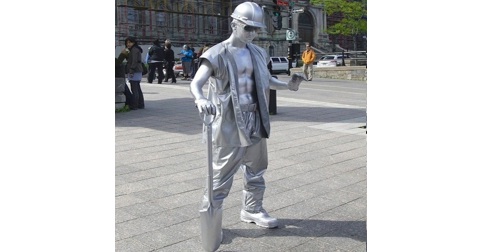Paves the way
 A native speaker recently asked me how to spell pays; at least that’s the word I perceived him as saying. “P.A.Y.S.,” I replied. He frowned: “No, pays as in pays the way for something – makes something possible.” “Ah,” I said, “paves the way – that’s P.A.V.E.S.” His frown deepened. “Isn’t it T.H.?” he asked, “P.A.T.H.E.S.?” “No,” I replied, “there’s no such word as pathes.”
A native speaker recently asked me how to spell pays; at least that’s the word I perceived him as saying. “P.A.Y.S.,” I replied. He frowned: “No, pays as in pays the way for something – makes something possible.” “Ah,” I said, “paves the way – that’s P.A.V.E.S.” His frown deepened. “Isn’t it T.H.?” he asked, “P.A.T.H.E.S.?” “No,” I replied, “there’s no such word as pathes.”
He still wasn’t satisfied. “There’s bath and bathe,” he said; “why isn’t it path and pathe?”
This was ingenious but off the mark. The word path is Germanic, while pave is from Old French: as far as I’m aware, the words are unrelated. Either way, there’s no verb to pathe.
Non-natives who want to sound more native can learn from this conversation. The consonants /v/ as in pave and /ð/ as in bathe are both weak, especially /ð/, and they sound quite similar. They’re both weaker than /s/ or /z/. Notably, the ending -s is more strongly pronounced than a preceding /v/ or /ð/. Non-natives often under-pronounce final consonants: the later in a word a sound appears, the more weakly they tend to pronounce it. But the ending -s is important in English and should never be skimped. Even if the next word is the, as it so often is, -s remains stronger than the consonants around it.
So in running speech paves the way can easily sound rather like pays the way. Likewise, bathes the child can sound like bays the child. And, if the word pathes existed, it could sound rather like paves. Here is paves the way, first hyper-articulated and then said more rapidly:
And, similarly, bathes the child:
Further notes
The auditory-acoustic similarity of /v/ and /ð/ underlies the increasing tendency of British speakers to replace /ð/ with /v/ non-initially, so that other rhymes with cover and breathe rhymes with leave. I show video examples of BBC presenters doing this in my blog post here.
My interlocutor is certainly not the first person to posit a verb pathe. Mitko Sabev has kindly forwarded an entry for it from the Oxford English Dictionary, which contains this:
Etymology: Apparently a variant or alteration of another lexical item. Etymons: PAVE v.
Apparently a variant of PAVE v., probably by association with PATH n. Compare PAITHMENT n., PATH v., PATHING n. Examples from before the 20th cent. not having the -ed or -ing form are rare, so that the spelling and pronunciation of the base form are unclear; but compare PAITHMENT n., with Middle English long ā and its later reflexes. In recent use the base form (with and without the 3rd singular present ending -s) has been spelt pathe, implying the pronunciation /peɪð/.
Now colloq. (nonstandard).
Google currently finds about eight and a half million results for “pave the way”, about 3,750 for “pathe the way”.

